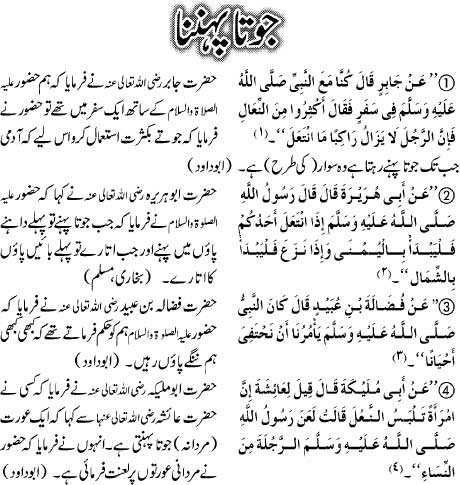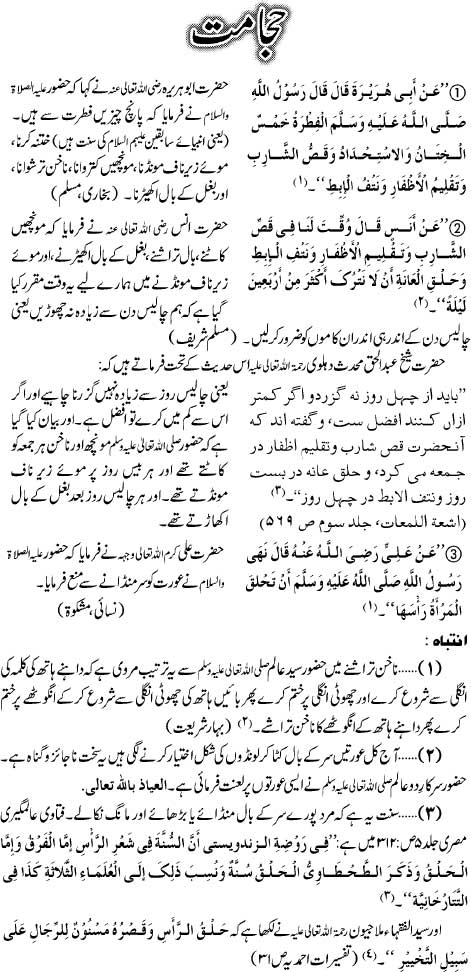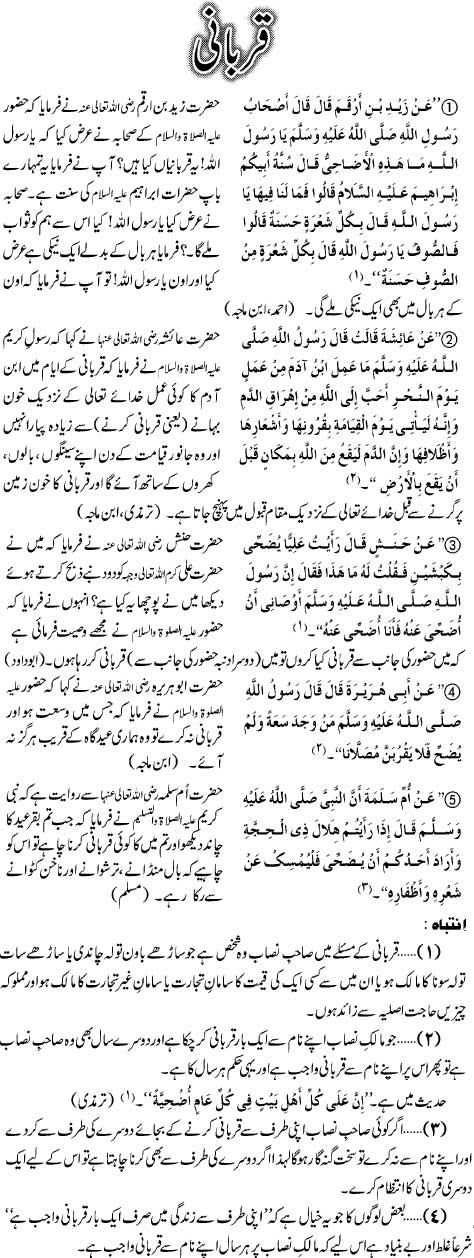
Beautiful Sayings Of Prophet Muhammad(Salaho Alhi Wasalam)
Abu Hurairah (May Allah be pleased with him) reported: The Prophet (PBUH) said, “He who believes in Allah and the Last Day must either speak good or remain silent.”[Muslim].
Abu Musa Al-Ash`ari (May Allah be pleased with him) reported: I asked the Messenger of Allah (PBUH): “Who is the most excellent among the Muslims?” He said, “One from whose tongue and hands the other Muslims are secure. ”[Al-Bukhari and Muslim].
Sahl bin Sa`d (May Allah be pleased with him) reported: The Messenger of Allah (PBUH) said, “Whosoever gives me a guarantee to safeguard what is between his jaws and what is between his legs, I shall guarantee him Jannah. ”[Al-Bukhari].
Abu Hurairah (May Allah be pleased with him) reported: I heard the Prophet (PBUH) saying, “A person utters a word thoughtlessly (i.e., without thinking about its being good or not) and, as a result of this, he will fall down into the fire of Hell deeper than the distance between the east and the west.”[Al-Bukhari and Muslim].
Abu Hurairah (May Allah be pleased with him) reported: The Prophet (PBUH) said, “A man utters a word pleasing to Allah without considering it of any significance for which Allah exalts his ranks (in Jannah); another one speaks a word displeasing to Allah without considering it of any importance, and for this reason, he will sink down into Hell. ”[Al-Bukhari].
Abu ‘Abdur-Rahman Bilal bin Al-Harith Al-Muzani (May Allah be pleased with him) reported: The Messenger of Allah (PBUH) said, “A man speaks a good word without knowing its worth, Allah records for him His Good Pleasure till the day he will meet Him; and a man utters an evil word without realizing its importance, Allah records for him His displeasure till the day he will meet Him. ”[Imam Malik and At-Tirmidhi].
Abu Hurairah (May Allah be pleased with him) reported: The Messenger of Allah (PBUH) said, “He whom Allah saves from the evil of that which is between his jaws and the evil of that which is between his legs will enter Jannah.”[At-Tirmidhi] .
‘Uqbah bin `Amir (May Allah be pleased with him) said: I asked the Messenger of Allah (PBUH), “How can salvation be achieved?” He replied, “Control your tongue, keep to your house, and weep over your sins.”[At-Tirmidhi] .
Abu Sa`id Al-Khudri (May Allah be pleased with him) said: The Prophet (PBUH) said, “When the son of Adam gets up in the morning, all the limbs humble themselves before the tongue and say: `Fear Allah for our sake because we are with you: (i.e., we will be rewarded or punished as a result of what you do) if you are straight, we will be straight; and if you are crooked, we will become crooked. ”'[At-Tirmidhi].
Hajamat Kay Ahkam

Hajamat Kay Sharai Ahkam Aur Masail
After Performing Umrah For Men
Sahih Al-Bukhari Hadith
Hadith 2.785 Narrated by: Abdullah bin Umar
Allah’s Apostle said, “O Allah! Be merciful to those who have their head shaved [after performing UMRA) .” The people said, “O Allah’s Apostle! And (invoke Allah for) those who get their hair cut short.” The Prophet said, “O Allah! Be merciful to those who have their head shaved.” The people said, “O Allah’s Apostle! And those who get their hair cut short.” The Prophet said (the third time), “And to those who get their hair cut short.” Nafi’ said that the Prophet had said once or twice, “O Allah! Be merciful to those who get their head shaved,” and on the fourth time he added, “And to those who have their hair cut short.”
Sahih Al-Bukhari Hadith
Hadith 2.786 Narrated by Abu Huraira
Allah’s Apostle said, “O Allah! Forgive those who get their heads shaved.” The people asked. “Also those who get their hair cut short?” The Prophet said, “O Allah! Forgive those who have their heads shaved.” The people said, “Also those who get their hair cut short?” The Prophet (invoke Allah for those who have their heads shaved and) at the third time said, “also (forgive) those who get their hair cut short.”
Kisi Bhi Haal Mein Allah Ki Rehmat Say Mayoos Na Ho

Learn To Listen, Just As You Learn To Speak
If a person starts telling you, whether in private or public, something that you already knew very well, pretend as if you do not know it. Do not rush to reveal your knowledge or to interfere with the speech. Instead, show your attention and concentration.
Imam Ata Bin Abi Rabah said: “A young man would tell me something that I may have heard before he was born. Nevertheless, I would listen to him as if I had never heard it before.”
Ata was a Tabi’ee, i.e. the one belonging to the generation coming after the Companions.
Khalid Bin Safwan Al-Tamimi, who frequented the courts of two Caliphs, Umar Bin Abdul Aziz and Hisham Bin Abdul Malik, said: “If a person tells you something you have heard before or news that you already learned, do not interrupt him to exhibit your knowledge to those present. This is being rude and ill-mannered.”
Ibrahim Bin Al-Junaid said: “A wise man said to his son: ‘Learn the art of listening as you learn the art of speaking.'”
Listening well means maintaining eye contact, allowing the speaker to finish the speech, and restraining your urge to interrupt his speech. Al-Hafiz Al-Khateeb Al-Baghdadi said in a poem:
Never interrupt a talk
Though you know it inside out
Qurbani Kay Ahkam

Offering Sacrifice In The Name Of Allah
Offering sacrifice is the tradition of our father Ibrahim (peace be upon him) and our Prophet Muhammad (peace be upon him). Allah has promised reward on every part of the animal that you sacrifice, even on its hair. The Prophet (peace be upon him) said, “On the day of sacrifice, no one does a deed more pleasing to Allah than the shedding of blood. The sacrificial animal will come on the Day of Resurrection with its horns, hair, and hooves (and its owner will be rewarded on that basis); and (its) blood finds acceptance with Allah (for its owner) before it falls on the ground, so rejoice over it.” (Tirmidhi)
Slaughtering an animal is better than giving its monetary value in charity. The deed of sacrificing an animal is a recommended or stressed Sunnah (Sunnah Mu’akkadah) for those who can afford it. Slaughter on your behalf and your household, including your wives, children, and parents, so that all of them will gain its reward. This was the practice of the Prophet (peace be upon him). He slaughtered for himself and on behalf of his family. Some people offer sacrifice only on behalf of their parents, depriving themselves and their households of the reward. It is preferable to sacrifice in the name of all (the household). If one is appointed to slaughter then he should fulfill the will accurately.
Many Muslims offer sacrifice on behalf of their deceased relatives during the first year of their death. They call it Dahiyyah Al-Hufrah (the sacrifice of the grave) – this practice has no basis in Shariah. Some people wipe or mark the animal from its face till the back of its neck to specify the owner of the animal. One should only state the owner by mentioning his name while slaughtering, without wiping. This was the conduct of the Prophet (peace be upon him). Moreover if one sacrifices the animal with only the intention and without mentioning the name of its owner, it still will be sufficient.
The sacrifice should be of camels, cows, sheep, or goats. It cannot be valid unless it meets two conditions:
· The animal must have reached the required age
· It must be free of certain defects that invalidate sacrifice.
Age specifications are as follows:
· Camels: Five years old.
· Cows: Two years old.
· Goats: One-year-old.
· Sheep: Six months old.
The defects that invalidate sacrifice have been explained by the Prophet (peace be upon him) in the following Hadith.
“Four (types of animals) should be avoided in sacrifice: A lame animal whose lameness is evident, a one-eyed animal which is clearly one-eyed, an animal which is clearly ill and an emaciated animal with no fat on it.” (Ahmad)
· The clear lameness is identified by the animal’s inability to fight and keep up with healthy animals.
· An animal with a defective eye – either popping out or completely concealed – is identified as one-eyed. If the imperfection is not detectable – even though the animal cannot see with it – the sacrifice will still be valid but disliked.
· The way it trots, the type of appetite it has, and other similar factors determine if the animal is healthy. An ailing animal whose poor health is obvious can be accepted as a legitimate sacrifice. In any case, it is preferable to offer an animal in the sacrifice that is free from all such defects.
· If the sacrificial animal is so thin that its bones contain no marrow, it will not be accepted as a valid sacrifice.
The sounder the sacrificial animal is, the more acceptable it becomes. The male animal, whether castrated or not, is acceptable as the Prophet (peace be upon him) offered both in sacrifice. However, the fleshier the animal, the more satisfactory it is.
Slaughtering a goat or a sheep is better than one-seventh of a camel or a cow, even though both are equivalent. One may share a cow or camel with six other persons, hoping reward for all of them. Sacrificing a pregnant animal is also equally acceptable.
One should slaughter his sacrificial animal himself if he is able to. If he cannot, he can hire someone to do it and should attend the slaughtering. If he is not present, the sacrifice is still valid. If a person slaughtered an animal thinking it was his but found out later that it belonged to someone else, then the sacrifice will be credited to the real owner, he will receive the reward for it and will be entitled to its meat.
For instance, if there is a yard with several sacrificial animals in it and a person takes one of them, assuming that it is his and slaughters it, but later discovers that it did not belong to him, then although the sacrifice is valid, the one who mistakenly slaughtered the animal does not receive the credit or reward for it. His position is like that of someone appointed to slaughter on behalf of the owner.
Halal Aur Haram Janwar

Four Principles Of Worship
The verse: “You alone do we worship.” (Qur’an, 1:5) is built on four principles:
1. Saying of the heart
It is i’tiqad (belief) in what Allah informed about His Self; concerning His Names, His Attributes, His Actions, His Angels, and all that He revealed upon His Messenger (peace be upon him).
2. Saying of the tongue
It is to inform and convey (what Allah has revealed), to call to it, defend it, to explain the false innovations which oppose it, to establish its remembrance, and to convey what it orders.
3. Action of the heart
Love for (Allah), reliance upon Him, repenting to Him, having fear and hope in Him, making the religion purely and sincerely for Him, having patience in what He orders and prohibits, having patience with what He decrees, and being pleased with it are some examples. These are connected with the action of limbs. In fact actions of limbs without the heart are of little benefit, if any benefit at all.
4. Action of the limbs
Such as salah and jihad, attending the Jumu’ah (Friday prayers), aiding those who are (needy), and displaying kindness to the creation.
So Al-’Ubudiyyah (servitude to Allah) is a comprehensive term for all these four stages. The one who actualizes them has indeed actualized: “You alone do we worship.”
Madarij-us-Salikin (1/100-101)

